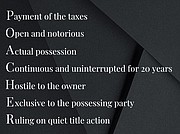Marty and Max: Easements and adverse possession
Hey Max: My neighbor is storing his trailer and stuff on my property. I really don’t mind but he did not ask and I am concerned. Do I have anything to be worried about? Can I lose my property?
In Idaho, a property must be held and adversely possessed for 20 years. A person claiming adverse possession must present clear and convincing evidence that the property has been protected by a substantial enclosure and has been usually cultivated or improved. All taxes (state, county and municipal) which have been levied upon the land according to law must be paid by the party or person, their predecessors and grantors. The key to this is that it must be hostile to the owner. You can provide written permission of use and clearly communicate the property boundaries as this is the best defense against a future claim. AKA POACHER
Hey Max: My neighbor wants to put up a shop and needs to travel across a strip of my land to access his building site. I do not see a problem with it. He said he won’t need to access my property once it is built.
An easement is the right to cross or use someone else’s land for a specific purpose. The owner of the easement does not own the land, just the right to use. The owner of the land may also use the area covered by the easement as long as they do not interfere with the purposes of the easement. For example, an easement for a buried gas line through farmland does not typically prevent the landowner from farming over the gas line. Land that is burdened by an easement is called the servient estate whereas the land that is benefitted by an easement is called the dominant estate. They “run with the land” and are transferred from one owner to another when the land is sold. There are many types including but not limited to: appurtenant, by necessity, by prescription, an easement in gross, solar and view.
The question that must be asked, however, is how the shop will be used. If the intent is for an office or art studio, you may not have any issues, however, if the intent is to access the shop with a trailer, vehicle or ATV, you may be granting an “Easement By Necessity.” Idaho does not have any specific laws requiring access from a public road to landlocked property, so once the shop is built you may be required to grant access. If the shop will not need vehicular traffic, you can simply grant a “license” or “restrictive easement” which grants access to your property for a specific period of time. Be careful and review the design. If large shop doors are part of the design you may want to consider declining. Although you and your neighbor are friendly, oftentimes the problems begin when the property sells. If and when the easement is granted, you will have responsibilities.
How does an easement affect the person who grants it?
The landowner who grants the easement usually cannot build structures on or near the easement. Before purchasing make sure you know where all easements are located.
Who maintains the property?
Maintenance of the property is the responsibility of the landowner.
Will a building permit include information about easements?
No. All landowners should check the title for any easements or right-of-way agreement prior to undertaking any construction or building. The landowner may be faced with all costs of removal and associated with unauthorized location of improvements.
As part of our service we provide resources of quality business partners. If you have had a good experience with a builder, contractor, tradesman or banker let’s give them a shout-out.
If you are in need of a quality electrician at a fair price contact: Solid Rock Electric, Nathan Parks, 208-518-9674
• • •
Marty Walker is a licensed real estate professional and paid consultant. Information shared in this column is of a general nature. For specific questions in relation to your unique property, email to set a time for a consultation. Information: MartyandMax.com or Martywalker@remax.net



